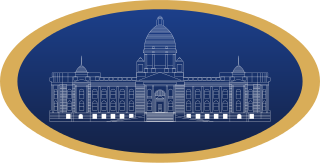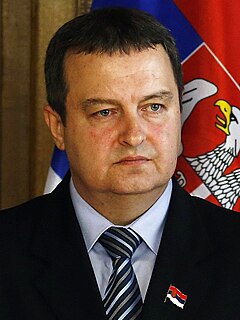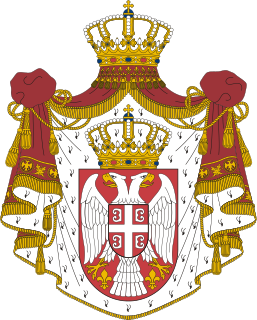
Bosniak People's Party is a national minority party in Serbia. It currently has one member in the National Assembly and is in coalition with the ruling Serbian Progressive Party.

Bosniak People's Party is a national minority party in Serbia. It currently has one member in the National Assembly and is in coalition with the ruling Serbian Progressive Party.

Yugoslavia was a country in Southeast Europe and Central Europe for most of the 20th century. It came into existence after World War I in 1918 under the name of the Kingdom of Serbs, Croats and Slovenes by the merger of the provisional State of Slovenes, Croats and Serbs with the Kingdom of Serbia, and constituted the first union of the South Slavic people as a sovereign state, following centuries in which the region had been part of the Ottoman Empire and Austria-Hungary. Peter I of Serbia was its first sovereign. The kingdom gained international recognition on 13 July 1922 at the Conference of Ambassadors in Paris. The official name of the state was changed to Kingdom of Yugoslavia on 3 October 1929.

The Kingdom of Yugoslavia was a state in Southeast and Central Europe that existed from 1918 until 1941. From 1918 to 1929, it was officially called the Kingdom of Serbs, Croats and Slovenes, but the term "Yugoslavia" was its colloquial name due to its origins. The official name of the state was changed to "Kingdom of Yugoslavia" by King Alexander I on 3 October 1929.

The Independent Democratic Serb Party is a social democratic, socially liberal and pro-european political party representing the Serb minority in the Republic of Croatia.

The Serbian Radical Party is a far-right ultranationalist political party in Serbia. The party was founded in 1991 by paramilitary leader and convicted war criminal Vojislav Šešelj.
The Democratic Party of Serbia is a national-conservative and Christian-democratic political party in Serbia.

The State of Slovenes, Croats and Serbs was a political entity that was constituted in October 1918, at the end of World War I, by Slovenes, Croats and Serbs residing in what were the southernmost parts of the Austro-Hungarian Empire. Although internationally unrecognized, this was the first incarnation of a Yugoslav state founded on the Pan-Slavic ideology. Thirty-three days after it was proclaimed, the state joined the Kingdom of Serbia to form the Kingdom of Serbs, Croats and Slovenes.

The Prime Minister of Serbia, officially the President of the Government of the Republic of Serbia, is the head of the executive of the government of Serbia. The prime minister directs the work of the government, and to submit to the National Assembly the government's program, including a list of proposed ministers. The resignation of the prime minister results in the dismissal of the government.

The National Assembly is the unicameral legislature of Serbia. The assembly is composed of 250 deputies who are proportionally elected to four-year terms by secret ballot. The assembly elects a president (speaker) who presides over the sessions.

Ivica Dačić is a Serbian politician serving as the president of the National Assembly of Serbia since 2020 and as the leader of the Socialist Party of Serbia since 2003.

The breakup of Yugoslavia occurred as a result of a series of political upheavals and conflicts during the early 1990s. After a period of political and economic crisis in the 1980s, constituent republics of the Socialist Federal Republic of Yugoslavia split apart, but the unresolved issues caused bitter inter-ethnic Yugoslav wars. The wars primarily affected Bosnia and Herzegovina, neighbouring parts of Croatia and, some years later, Kosovo.

The Politics of Serbia are defined by a unitary parliamentary framework that is defined by the Constitution of Serbia in which the president, currently Aleksandar Vučić, is the head of state while the prime minister, currently Ana Brnabić, is the head of government. Executive power is exercised by the Serbian government and the President of Serbia. Legislative power is vested in the unicameral National Assembly which is composed of 250 proportionally elected deputies. The judiciary is independent and is headed by the Supreme Court of Cassation, which is also the highest court in Serbia.
Serbia elects a legislature and a president on a national level. The National Assembly of Serbia has 250 members elected for a four-year term. Serbia has a multi-party system, with numerous parties in which no one party often has a chance of gaining power alone, and parties must work with each other to form coalition governments. A party must receive at least 3% of the votes in the entire country to qualify for any seats, except for national minorities' parties, who only have to reach 0.4%.

The Socialist Republic of Serbia, previously known as the People's Republic of Serbia, was one of the six constituent republics of the Socialist Federal Republic of Yugoslavia. Its formation was initiated in 1941, and achieved in 1944–1946, when it was established as a federated republic within Yugoslavia. In that form, it lasted until the constitutional reform in 1990–1992, when it was reconstituted, as the Republic of Serbia within the Federal Republic of Yugoslavia. It was the largest federated state within Yugoslavia, in terms of population and territory. Its capital, Belgrade, was also the federal capital of Yugoslavia.

Parliamentary elections were held in Serbia on 21 January 2007 to elect members of the National Assembly. The first session of the new National Assembly of the Republic of Serbia was held on 14 February 2007. The elections enabled the coalition of DS; DSS & G17+ to continue.

The Serbian Progressive Party is a populist political party in Serbia which has been the ruling party since 2012.

Parliamentary elections were held in Serbia on 6 May 2012 to elect members of the National Assembly, and were held simultaneously with provincial, local, and presidential elections.

The coalition around the Serbian Progressive Party or the SNS-led coalition, currently named For Our Children, is a catch-all ruling political coalition in Serbia and a parliamentary group in the National Assembly.

Parliamentary elections were held in Serbia on 16 March 2014, with nineteen electoral lists competing for 250 members of the National Assembly. The election was called early, after tensions in the coalition led by Serbian Progressive Party (SNS) and Socialist Party of Serbia (SPS), who ruled the country since 2012. President of Serbia Tomislav Nikolić scheduled the election at the same time as previously announced Belgrade City Assembly election. According to the preliminary results based on 99.08% of counted votes, the turnout was 53.09%, with 3.22% votes invalid.
The Green Party is political party in Serbia, based in Novi Sad. The party also represents the Slovak minority in Serbia.